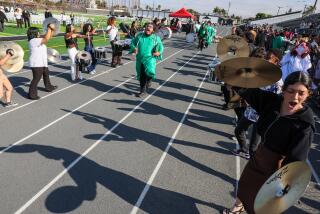They’re not just whistling ‘Dixie’
- Share via
DECATUR, ALA. — With darkness settling over the battlefield and soldiers bedding down for the night, the familiar lyrics rose -- music and voices blending from Union and Confederate camps.
‘Mid pleasures and palaces though we may roam,
Be it ever so humble there’s no place like home!
On more than one occasion during the Civil War, those words -- from the prewar hit “Home, Sweet Home” -- brought the two sides together, an impromptu and peaceful battle of the bands.
For the bored and lonely men trying to while away the evenings, military bands provided comfort and entertainment.
Now several dozen bands around the country perform music from the Civil War era -- often on authentic instruments and in period attire -- but not just to entertain. By telling stories that go with the music, they also provide a lesson in history, a glimpse into the lives of the soldiers and their families as they fought to define the nation’s future.
“We read from the actual diaries of musicians, so you can hear in their own words how they felt about what they were doing at that time,” said Jari Villanueva, an expert on music from the era who co-founded a band in Baltimore that has both Union and Confederate uniforms.
The band, whose members range in age from 16 to 58, plays Union music as the Federal City Brass Band and Confederate music as the 26th North Carolina Regimental Band.
“When you play music from a given time period, you can really look into what a society was all about at that time,” said Villanueva, who has read hundreds of the diaries at the Library of Congress in Washington.
He said the songs from the Civil War -- with their depictions of how life was before the war, their patriotic messages, and the longing for loved ones left at home -- gave some insight into what the soldiers on both sides believed they were fighting for.
John James, of the Fort Hill String Band in Louisville, Ky., said one of the requests his band got most often was for a song called “Lorena” that was popular before the war and was a favorite of Confederate soldiers. James said it was rumored that field commanders didn’t like bands to play the sad song about lost love for fear that it would cause men to lose heart or even desert.
James said that he hopes the music will ignite an interest in the history of the war itself.
“A lot of historians talk about the Civil War being a defining point in our history, and I think so too,” he said. “It settled some important issues once and for all for our country -- slavery, secession and the role of the federal government. So I think it’s really important for people to learn about that era.”
Many folks listening to the music already know the period well, and for some the tensions have not faded.
“When we first started playing the music, we were under the misapprehension that the war was over,” joked Joe Ewers, a founding member of the Gettysburg, Pa.-based 2nd South Carolina String Band.
When the band included two Union songs -- “Marching Through Georgia” and “Lincoln and Liberty Too” -- on its second album, it “made it virtually impossible to sell that tape in parts of the South.” The songs were dropped when the band combined its first two tapes in a CD.
An Illinois native, the 63-year-old Ewers said he had identified with the Confederacy since he first started learning about U.S. history at the age of 10. “I can’t explain why,” he said, noting that his bandmates, most from the North, feel the same. “The heart knows no Mason-Dixon line.”
At the end of a dance, the band plays “Dixie,” pairing it with “Southern Soldier.”
Though strongly associated with the South today, ‘Dixie’ had broader appeal during the war.
“ ‘Dixie’ was present in some version or another in almost every Union band book, and Abraham Lincoln is known to have requested it on numerous occasions,” said Bob Baccus, who plays with the Olde Towne Brass band, based in Huntsville, Ala.
Baccus, 59, spoke on a recent evening to an audience gathered in a riverfront park in Decatur, where the band performed.
Though the seven members of Olde Towne Brass are all Southerners, they don’t shy away from Union songs.
“I’m from the South. I was born here,” said Baccus. “But we see ourselves as historians. We like to play the songs from both sides to tell the history.”
Not all Civil War bands today perform on authentic instruments, but those who do give audiences a unique experience.
“To see it live and actually performed on original instruments that the musicians used 140 or 150 years ago, you realize the sound is quite different, it’s not as harsh,” said Mark Elrod, who co-founded the Federal City Brass Band with Villanueva.
The softer sound comes from the way the instruments were made. The bells of the horns were hammered by hand and the metal was much thinner than that of modern instruments.
That construction makes the old instruments more susceptible to environmental conditions: The sun going behind a cloud can change the pitch.
Baccus, whose band plays on period solid nickel silver horns -- including rare over-the-shoulder horns whose bells point backward, toward the troops -- said the instruments are hard to come by.
“You put your business card in every antique shop and make it known you are looking for them,” he said.
More to Read
The biggest entertainment stories
Get our big stories about Hollywood, film, television, music, arts, culture and more right in your inbox as soon as they publish.
You may occasionally receive promotional content from the Los Angeles Times.










